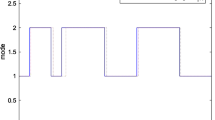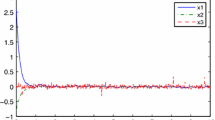Abstract
In this paper, the problem of dissipativity filtering for discrete-time nonlinear singular systems with distributed delays is addressed. An interval type-2 fuzzy model is employed to represent the nonlinear singular systems of which the parameter uncertainties are captured by interval type-2 membership functions characterized by lower and upper membership functions. Based on event-triggering scheme, an interval type-2 filter is proposed. By adopting the idea of input delay method, the filtering error systems is reformulated as a new event-triggering interval type-2 fuzzy singular systems with mixed time-delays. By using an improved reciprocally convex combination approach and some new techniques on matrix convexification to bound the forward difference of the double and the triple summation terms in the Lyapunov function, two less conservatism conditions have been derived. The event-triggered dissipative filter gains and the event-triggering parameters are obtained to determine the filter error singular systems admissible and dissipative. A numerical example is given to illustrate the effectiveness of this proposed method.
Similar content being viewed by others
References
T. Takagi and M. Sugeno, “Fuzzy identification of systems and its applications to modeling and control,” IEEE Transactions on Fuzzy System, vol. 15, no. 1, pp. 116–132, 1985.
X. Su, F. Xia, R. Yang, and L. Wang, “Reduced-order filter design of T-S fuzzy stochastic systems with time-varying delay,” Journal of the Franklin Institute, vol. 354, pp. 2310–2339, 2017.
J. Li, X. Huang, and Z. Li, “Extended dissipitive filtering of fuzzy systems with time-varying delay under imperfect premise matching,” International Journal of Systems Science, vol. 48, no. 8, pp. 1731–1743, 2017.
Z. Feng, W. Zheng, and L. Wu, “Reachable set estimation of T-S fuzzy systems with time-varying delay,” IEEE Transactions on Fuzzy System, vol. 25, no. 4, pp. 878–891, 2017.
X. Su and P. Shi, “A novel control design on discrete-time Takagi-Sugeno fuzzy systems with time-varying delays,” IEEE Transactions on Fuzzy System, vol. 21, no. 4, pp. 655–671, 2013.
X. Su, P. Shi, and L. Wu, “Reliable filtering with strict dissipativity for T-S fuzzy time-delay systems,” IEEE Transactions on Cybernetics, vol. 44, no. 2, pp. 2470–2483, 2014.
Z. Feng and P. Shi, “Admissibilization of singular interval-valued fuzzy systems,” IEEE Transactions on Fuzzy System, vol. 25, no. 6, pp. 1765–1776, 2017.
C. Zhang, J. Hu, J. Qiu, and Q. Chen, “Event-triggered nonsynchronized H∞ filtering for discrete-time T-S fuzzy systems based on piecewise Lyapunov functions,” IEEE Transactions on Systems, Man, and Cybernetics: Systems, vol. 47, no. 8, pp. 2330–2341, 2017.
J. Li, Z. Feng, and C. Zhang, “Reachable set estimation for discrete-time singular systems,” Asian Journal of Control, vol. 19, no. 5, pp. 1862–1870, 2017.
J. Dong and G. Yang, “Observer-based output feedback control for discrete-time T-S fuzzy systems with partly immeasurable premise variables,” IEEE Transaction on Systems, Man, and Cybernetics: Systems, vol. 47, no. 1, pp. 98–110, 2017.
Z. Zhang and J. Dong, “A Novel H∞ Control for T-S Fuzzy Systems with Membership Functions Online Optimization Learning,” IEEE Transaction on Fuzzy Systems, 2021, DOI:https://doi.org/10.1109/TFUZZ.2021.3053315.
H. Lam and L. Seneviratne, “Stability analysis of interval type-2 fuzzy-model-based control systems,” IEEE Transactions on Systems, Man, and Cybernetics-part B: Cybernetics, vol. 38, no. 3, pp. 617–628, 2008.
H. Lam, H. Li, C. Deters, E. Secco, H. Wurdemann, and K. Althoefer, “Control design for interval type-2 fuzzy systems under imperfect premise matching,” IEEE Transactions on Industrial Electronics, vol. 61, no. 2, pp. 956–968, 2014.
X. Yang, H. Lam, and L. Wu, “Membership-dependent stability conditions for type-1 and interval type-2 T-S fuzzy systems,” Fuzzy Sets and Systems, vol. 356, pp. 44–62, 2019.
M. Khanesar, E. Kayacan, M. Teshnehlab, and O. Kaynak, “Analysis of the noise reduction property of type-2 fuzzy logic systems using a novel type-2 membership function,” IEEE Transactions on Systems, Man, and Cybernetics-part B: Cybernetics, vol. 41, no. 5, pp. 1395–1406, 2011.
Z. Zhang, Q. Zhou, C. Wu, and H. Li, “Dissipativity-based reliable interval type-2 fuzzy filter design for uncertain nonlinear systems,” International Journal of Fuzzy Systems, vol. 20, no. 2, pp. 390–402, 2018.
H. Hargras, “A hierarchical type-2 fuzzy logic control architecture for autonomous mobile robots,” IEEE Transactions on Fuzzy Systems, vol. 12, no. 4, pp. 524–539, 2004.
R. Melgarejo, B. Bulla, and P. Siera, “An embedded type-2 fuzzy processor for the inverted pendulum control problem,” IEEE Latin America Transactions, vol. 9, no. 3, pp. 240–246, 2011.
M. Khanesar, E. Kayacan, M. Teshnehlab, and O. Kaynak, “Extended Kalman filter based learning algorithm for type-2 fuzzy logic systems and its experimental evaluation,” IEEE Transactions on Industrial Electronics, vol. 59. no. 11, pp. 4443–4455, 2012.
O. Castillo and P. Melin, Type-2 Fuzzy Logic Systems, Springer, 2012.
T. Zhao, Z. Wei, Y. Dian, and J. Xiao, “Observer-based H∞ controller design for interval type-2 T-S fuzzy systems,” Neurocomputing, vol. 177, pp. 9–25, 2016.
H. Li, L. Wu, H. Lam, and Y. Gao, Analysis and Synthesis for Interval Type-2 Fuzzy-model-based Systems, Springer, 2016.
Z. Zhang and J. Dong, “Fault-tolerant containment control for interval type-2 fuzzy networked multiagnent systems against denial-of-service attacks and actuator faults,” IEEE Transactions on Systems, Man, and Cybernetics: Systems, vol. 52, no. 4, pp. 2213–2224, 2022.
Z. Feng, J. Li, P. Shi, H. Du, and Z. Jiang, Analysis and Synthesis of Singular Systems, Elsevier, 2020.
S. Xu and J. Lam, “Robust stability and stabilization of discrete singular systems: an equivalent characterization,” IEEE Transactions on Automatic Control, vol. 19, no. 4, pp. 568–574, 2004.
X. Fan, Q. Zhang, and J. Ren, “Event-triggered sliding mode control for discrete-time singular system,” IET Control Theory and Applications, vol. 12, no. 17, pp. 2390–2398, 2018.
Z. Feng, W. Li, and J. Lam, “New admissibility analysis for discrete singular systems with time-varying delay,” Applied Mathematics and Computation, vol. 265, pp. 1058–1066, 2015.
L. Fu and Y. Ma, “Passive control for singular time-delay system with actuator saturation,” Applied Mathematics and Computation, vol. 289, pp. 181–193, 2016.
Z. Feng, W Li, and J. Lam, “Dissipativity analysis for discrete singular systems with time-varying delay,” ISA Transactions, vol. 64, pp. 86–91, 2016.
H. Li, Z. Chen, L. Wu, H. Lam, and H. Du, “Event-triggered fault detection of nonlinear network systems,” IEEE Transaction on Cybernetics, vol. 47, no. 4, pp. 1041–1052, 2017.
K. Liu, E. Fridman, K. Johansson, and Y. Xia, “Generalized Jensen inequalities with application to stability analysis of systems with distributed delays over infinite time-horizons,” Automatica, vol. 69, pp. 222–231, 2016.
S. Xu, B. Song, J. Lu, and J. Lam, “Robust stability and of uncertain discrete-time singular fuzzy systems,” Fuzzy Sets and Systems, vol. 158, pp. 2306–2316, 2007.
J. Li, H. Zhang, Z. Feng, Y. Zhao, and J. Shi, “Dissipative filter design for discrete-time interval type-2 fuzzy singular systems with mixed delays,” Optimal Control Applications and Methods, vol. 41, no. 4, pp. 1016–1033, 2020.
Z. Fei, C. Guan, and P. Shi, “Further results on H∞ control for discrete-time Markovian jump time-delay systems,” International Journal of Control, vol. 90, no. 7, pp. 1505–1517, 2017.
Author information
Authors and Affiliations
Corresponding author
Additional information
Publisher’s Note Springer Nature remains neutral with regard to jurisdictional claims in published maps and institutional affiliations.
This work was supported in part by the National Natural Science Foundation of China [grant numbers 61763045, 61763046], in part by the Natural Science Foundation of Shaanxi Province of China [grant number 2020JM-552] and in part by the Natural Science Foundation of Yanan University [grant number YDY2020-25].
Jiangrong Li received her B.S. degree in mathematics from Shaanxi Normal University, Xi’an, China, in 2001, an M.S. degree and a Ph.D. degree in applied mathematics from Xidian University, Xi’an, China, in 2006, 2012, respectively. From 2017 to 2018, she was a visiting fellow at Victoria University, Melbourne, Australia. She is currently a Professor at Yanan University, Yanan, China. Her research interests include fuzzy systems, singular systems, reachable set estimation, and dissipative control.
Zhiguang Feng received his B.S. degree in automation from Qufu Normal University, Rizhao, China, in 2006, an M.S. degree in control science and engineering from Harbin Institute of Technology, Harbin, China, in 2009, and a Ph.D. degree in the Department of Mechanical Engineering, The University of Hong Kong, Hong Kong, in 2013. He was a Research Associate in the Department of Mechanical Engineering, University of Hong Kong, Hong Kong, from 2013 to 2015, he was a visiting fellow at University of Western Sydney, Australia. He was appointed with Victoria University in Australia as Postdoctoral Research Fellow from 2015 to 2017. In 2019, he was a Vice-Chancellor’s Postdoctoral Research Fellowship at University of Wollongong, NSW, Australia. He is currently a Professor at Harbin Engineering University, Harbin, China. His research interests include singular systems, time-delay systems, robust control, dissipative control, and reachable set estimation.
Changzhu Zhang received his B.S. degree in automation from Qufu Normal University, Rizhao, China, in 2007, an M.S. degree in control science and engineering from Harbin Institute of Technology, Harbin, China, in 2009, and a Ph.D. degree in mechatronics engineering from City University of Hong Kong, Hong Kong, in 2012. From 2013 to 2014, he was with the Institute of Advanced Study, Tongji University, Shanghai, China, as an Associate Research Fellow. From 2017 to 2018, he was a research fellow with the Department of Informatics, King’s College London, London, United Kingdom. Since 2014, he has been with the College of Electrical and Information Engineering, Tongji University, Shanghai, China, where he is currently an Associate Professor. His research interests include intelligent control, networked control systems, signal processing, and autonomous driving.
Juan Shi is an Associate Professor in the College of Engineering and Science at Victoria University (VU), Melbourne, Australia. She received her Bachelor of Engineering degree (Honours) in electrical engineering from Northeastern University, China, in 1988 and her Ph.D. degree in electrical engineering from VU, Melbourne, Australia in 1995. Her current research interests include intelligent control and its applications, smart energy systems, and robust autonomous navigation for mobile robots and vehicles.
Rights and permissions
About this article
Cite this article
Li, J., Feng, Z., Zhang, C. et al. Dissipative Filtering of Interval Type-2 Fuzzy Singular Time-delay Systems via Event-triggering Mechanism. Int. J. Control Autom. Syst. 21, 1020–1031 (2023). https://doi.org/10.1007/s12555-021-1084-y
Received:
Revised:
Accepted:
Published:
Issue Date:
DOI: https://doi.org/10.1007/s12555-021-1084-y




